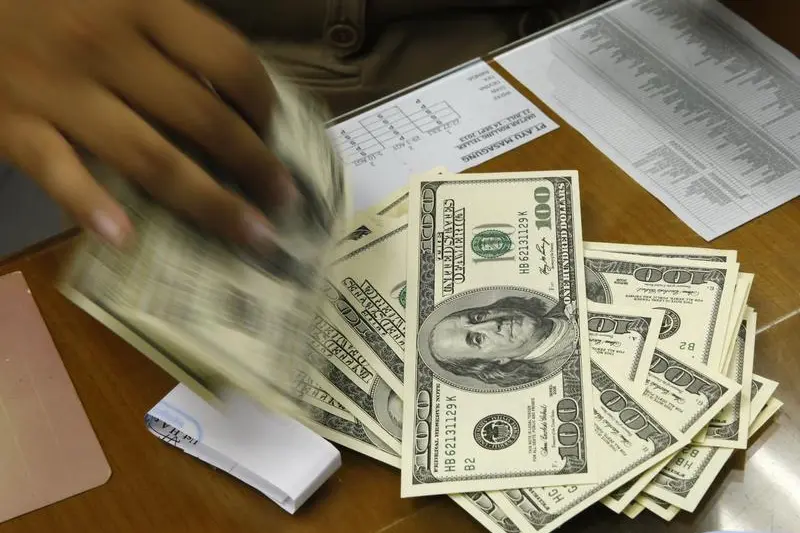PHOTO
NEW YORK - A grinding rally in the dollar is picking up speed, fueled by a hawkish tilt from the Federal Reserve, rising Treasury yields and concerns over the possibility of a drawn-out battle to raise the U.S. debt ceiling.
The greenback is up 4.7% year-to-date and stands near its highest level in a year against a basket of currencies. Net bets on the dollar in futures markets are at a more than 18-month high, according to data from the CFTC.
Because the dollar is the world's dominant currency, its trajectory can have far-reaching implications for everyone from corporations to global central banks.
While a robust dollar can be a sign of economic strength, a too-rapid rally in the currency can also hit the balance sheets of U.S. exporters by making their products less competitive abroad and make it more expensive for multinationals to convert their funds back into their home currency.
"The U.S. dollar move we're seeing at present is due to a confluence of factors that are all aligning to create the perfect storm," said Simon Harvey, senior FX market analyst at Monex Europe in London.
One key driver of the dollar's strength has been a more hawkish Fed, which last week said it would start unwinding its $120 billion in monthly government bond purchases as soon as November and potentially begin raising rates in 2022, earlier than some investors had expected.
Yields on 10-year United States Treasury Inflation Protected Securities, which strip out inflation, have risen by about 37 basis points since early August, compared with a gain of only 5 basis points for its German counterpart. That has increased the attractiveness of dollar-denominated Treasuries compared with their foreign counterparts.
"It seems the consensus view that (the) Fed taper was in the price of the dollar was incorrect," said Richard Benson, co-chief investment officer, at Millennium Global in London. "We've had a 20-30 basis-point backup in yields which has supported the dollar."
A nasty fight over raising the U.S. debt ceiling, which could result in a U.S. default if lawmakers do not agree by Oct. 18, is also pushing up the dollar, a popular destination for nervous investors.
So are worries over the meltdown of heavily indebted China Evergrande Group, once the country's top-selling real estate developer, as well as concerns over rising inflation and potentially slower growth, said Harvey, of Monex Europe.
The S&P 500 fell 4.8% in September, its worst month since March last year, while the dollar index rose 1.7%.
"The bulk of these factors are all pointing to a more stagflationary macro environment and are thus leading to markets taking shelter in the dollar," Harvey said.
Many are also trying to gauge a stronger dollar's potential effects on corporate balance sheets.
Companies in the technology sector are among the most exposed to currency fluctuations, with more than 54% of total revenue in the category coming from overseas, an analysis of Russell 1000 companies by Bespoke Investment Group showed. That is followed by the materials sector, where almost 46% of total revenue comes from abroad.
Matt Weller, global head of research at Forex.com, noted that despite the dollar's recent rally it remains flat from year-ago levels and below where it stood in past years.
"Most firms would start to worry about those risks if the dollar index starts to approach the 100.00 level as we head into 2022," he said. The index stood at around 94.25 late on Thursday.
Some investors believe the dollar's strength is unlikely to last. Analysts at Neuberger Berman said in a recent note that the dollar has entered a multi-year bear cycle after peaking in March 2020 and will eventually drift lower.
Their forecast is based on a confluence of factors, including projections of a decline in the United States' proportional contribution to world gross domestic product starting in 2022, which the firm said has coincided with dollar weakness in the past.
Others, however, are betting a hawkish Fed will likely keep the U.S. currency elevated in coming months.
The dollar could rise by as much as 10% from current levels on expectations of Fed tightening, analysts at Societe Generale said in a recent report.
Mazen Issa, senior FX strategist at TD Securities, expects rising real rates to continue supporting the dollar, though he does not believe the currency has reached levels where it could present a problem to companies.
"The U.S. dollar has demonstrated the capacity to flex through key technical markers and it will be difficult to unwind that in the near term," he said.
(Reporting by Gertrude Chavez-Dreyfuss and Saqib Iqbal Ahmed in New York Writing and additional reporting by Ira Iosebashvili Editing by Matthew Lewis) ((Ira.Iosebashvili@thomsonreuters.com;))





















